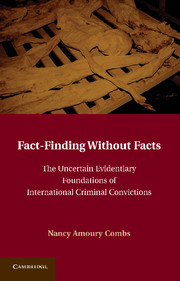 Fact-Finding without Facts
Fact-Finding without Facts Book contents
- Frontmatter
- Contents
- Acknowledgments
- Introduction
- 1 The Evidence Supporting International Criminal Convictions
- 2 Questions Unanswered: International Witnesses and the Information Unconveyed
- 3 The Educational, Linguistic, and Cultural Impediments to Accurate Fact-Finding at the International Tribunals
- 4 Of Inconsistencies and Their Explanations
- 5 Perjury: The Counternarrative
- 6 Expectations Unfulfilled: The Consequences of the Fact-Finding Impediments
- 7 Casual Indifference: The Trial Chambers' Treatment of Testimonial Deficiencies
- 8 Organizational Liability Revived: The Pro-Conviction Bias Explained
- 9 Help Needed: Practical Suggestions and Procedural Reforms to Improve Fact-Finding Accuracy
- 10 Assessing the Status Quo: They Are Not Doing What They Say They Are Doing, but Is What They Are Doing Worth Doing?
- Conclusion
- Bibliography
- Index
- References
5 - Perjury: The Counternarrative
Published online by Cambridge University Press: 05 October 2010
- Frontmatter
- Contents
- Acknowledgments
- Introduction
- 1 The Evidence Supporting International Criminal Convictions
- 2 Questions Unanswered: International Witnesses and the Information Unconveyed
- 3 The Educational, Linguistic, and Cultural Impediments to Accurate Fact-Finding at the International Tribunals
- 4 Of Inconsistencies and Their Explanations
- 5 Perjury: The Counternarrative
- 6 Expectations Unfulfilled: The Consequences of the Fact-Finding Impediments
- 7 Casual Indifference: The Trial Chambers' Treatment of Testimonial Deficiencies
- 8 Organizational Liability Revived: The Pro-Conviction Bias Explained
- 9 Help Needed: Practical Suggestions and Procedural Reforms to Improve Fact-Finding Accuracy
- 10 Assessing the Status Quo: They Are Not Doing What They Say They Are Doing, but Is What They Are Doing Worth Doing?
- Conclusion
- Bibliography
- Index
- References
Summary
Perjury stands as a compelling counternarrative to explain the testimonial problems heretofore identified. I have described already the ways in which a witness might feign ignorance or lack of understanding in order to make his accounts more plausible, more incriminating, and less likely to contradict the accounts of other witnesses or that same witness's previous account. Long, drawn-out exchanges in which the witness fails to answer the questions directly can similarly buy the witness time to consider which answers he wishes to provide and can even frustrate the interrogating counsel to such a degree that the counsel just abandons the line of questioning entirely. Finally, the potential of perjury to explain the inconsistencies just described is even more straightforward. Successive witness accounts may vary because the witness has forgotten the perjured details he earlier provided to investigators. Or a witness may not know the identity of the defendant at the time he provides his statement, so it is only later that he inserts the defendant into his account. Or the converse may be true. The witness may accurately inculpate the defendant during his pretrial interview but later find it in his interest to exculpate the defendant at trial.
As earlier noted, there is little way of ascertaining whether any given testimonial deficiency does in fact result from perjury, but what we can explore is whether other indications suggest that perjury is a considerable problem for the international tribunals.
- Type
- Chapter
- Information
- Fact-Finding without FactsThe Uncertain Evidentiary Foundations of International Criminal Convictions, pp. 130 - 166Publisher: Cambridge University PressPrint publication year: 2010


